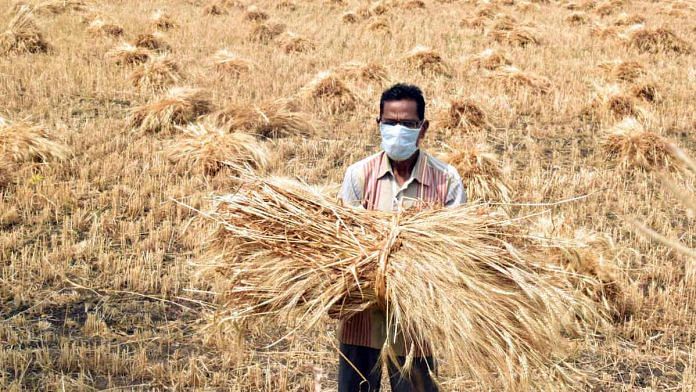New Delhi: This year’s hike in the Centre-fixed minimum support price (MSP) for the summer-sown pulses and oilseeds crops have been higher than other crops such as paddy due to low domestic production and higher international rates.
The Central government Wednesday increased the MSP of 14 kharif crops that will be harvested in the upcoming months.
The prices of oilseeds and pulses have been specially boosted to enhance production and lessen the country’s dependence on imports. Also, to counter inflation caused by prevailing conditions.
A pulses body had last week said that grains harvested this year were scarce in production against initial estimates. “Due to this, the price will remain high this year unless we import a substantial amount of pulses from major producing countries,” the Indian Pulses and Grains Association had said.
The maximum increase has been for oilseed sesame, a popular oil in domestic markets known for its nutritional value and health benefits. The sesame MSP was raised by Rs 452/quintal to stand at Rs 7,307/quintal, against last year’s Rs 6,855/quintal. This translates to a 6.59 per cent hike, the highest among all crops this year.
The MSP of groundnut — another crop that produces popular edible oil — was hiked by 5.21 per cent, to Rs 5,550/quintal from Rs 5,275/quintal.
The support price hike of pulses such as tur or arhar and urad follow closely as these commodities too have been expensive lately. Both saw an MSP increase of 5 per cent in absolute terms to Rs 6,300/quintal from Rs 6,000/quintal.
Also read: What’s MSP and how is it determined? The issue at the heart of farm protests
Retail price factor
The steep hike in MSP of pulses and oilseeds was also because of the increase in their retail and wholesale prices in the last few months.
Data sourced from the Department of Consumer Affairs showed that in the past year, the retail price of groundnut oil rose by Rs 30 to 80 per kg. Similarly, the price of soyabean oil, which is also an upcoming kharif crop, increased by Rs 40 to 85 per kg.
The price of groundnut oil in Delhi increased to Rs 202/kg from Rs 119/kg. The price of soyabean also increased to Rs 174/kg.
Most other popular edible oils such as mustard and palm have also increased exponentially in the last few months. Prices have hovered around Rs 150/kg for a while now.
The price of pulses, which saw revised MSPs, has also been trending above Rs 100/kg.
The retail price of tur/arhar dal — which is one of the leading pulses in the country — has increased over 19 per cent to Rs 123/kg from Rs 98/kg. Similarly, the price of urad, a staple ingredient of popular southern meals, has also increased to Rs 145/kg.
However, there have been some disappointments too. The soyabean MSP has been increased by just 1.80 per cent, to Rs 3,950/quintal from Rs 3,880/quintal. Last year, the soybean MSP had increased by 4.58 per cent.
In the case of moong, another major pulse crop, the MSP increase has been 1.10 per cent — to Rs 7,275/quintal from Rs 7,196/quintal. Last year, moong MSP had increased by 2.07 per cent.
Both these commodities have seen an inflationary trend with soyabean oil retail price increasing by over 35 per cent compared to last year while moong witnessed an increase of at least 7-10 per cent.
The MSP for the main kharif crop, paddy, has been raised marginally by Rs 72, to Rs 1,940/quintal from Rs 1,868/quintal.
This is because of the very high paddy procured in October last year. The Food Corporation of India, which procures the crop, has been facing storage issues due to the bumper harvest.
Meanwhile, the increase in MSP overall prices has been in the range of 1.08 per cent to 6.6 per cent for the upcoming 2021-22 harvest season. The average increase has been 3.7 per cent compared to last year.
The rates for coarse cereals jowar and bajra have been hiked by Rs 118 and Rs 100, respectively, to stand at Rs 2,738/quintal and Rs 2,250 quintal, respectively.
The bajra MSP has been increased 4.65 per cent, which is very low against last year’s 7 per cent.
Meanwhile, the lowest increase of MSP has been for maize — a hike of just Rs 20/quintal — to Rs 1,870 from Rs 1,850. Last year, the crop had seen a hike of 4.86 per cent in absolute terms.
The MSP of medium-staple cotton has been raised by Rs 211/quintal to Rs 5726/quintal for 2021-22. The price of long-staple cotton has been raised by Rs 200/quintal to stand at Rs 6025/quintal.
Also read: Why MSP is a fraud, writes Yogendra Yadav



